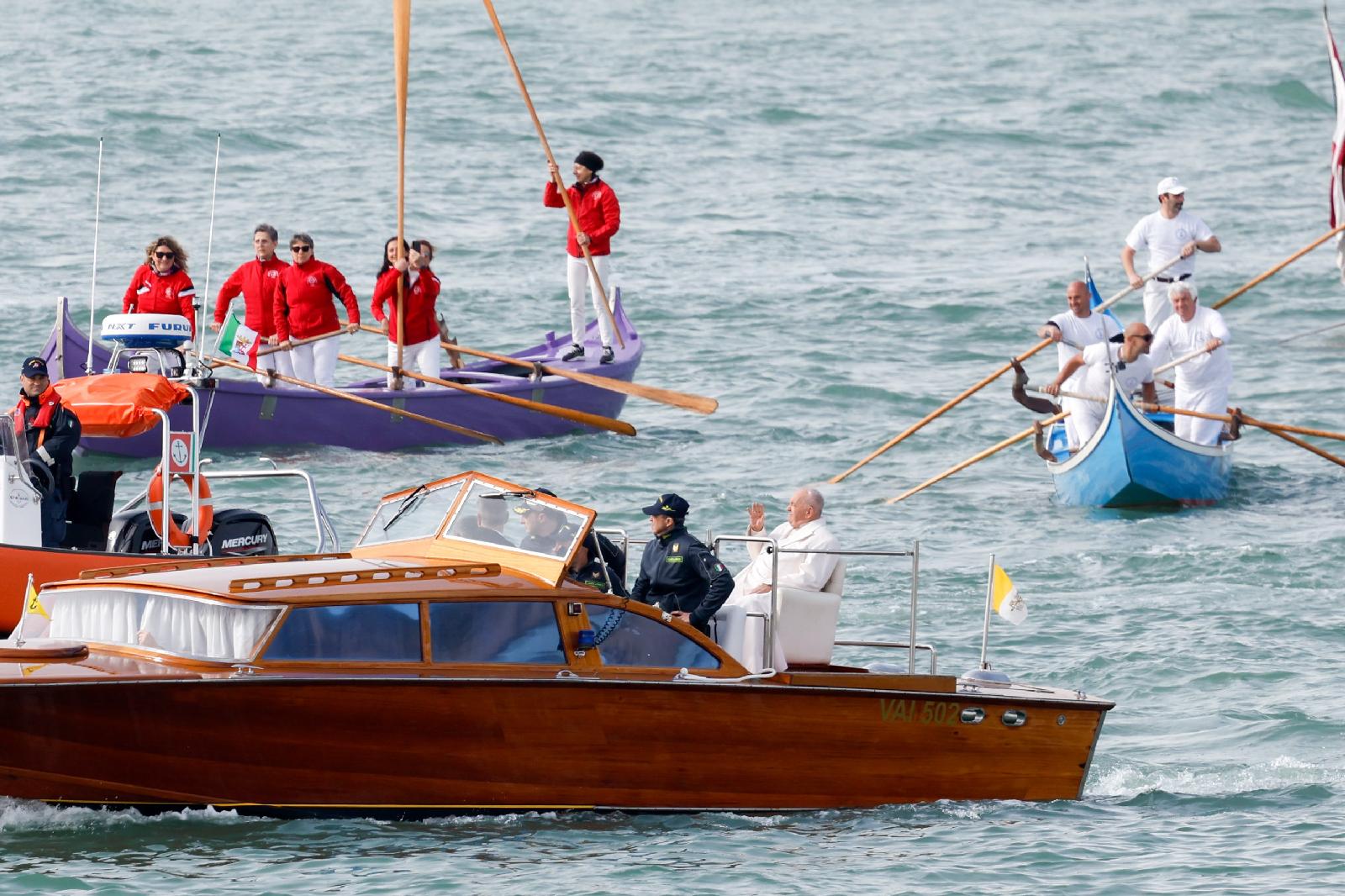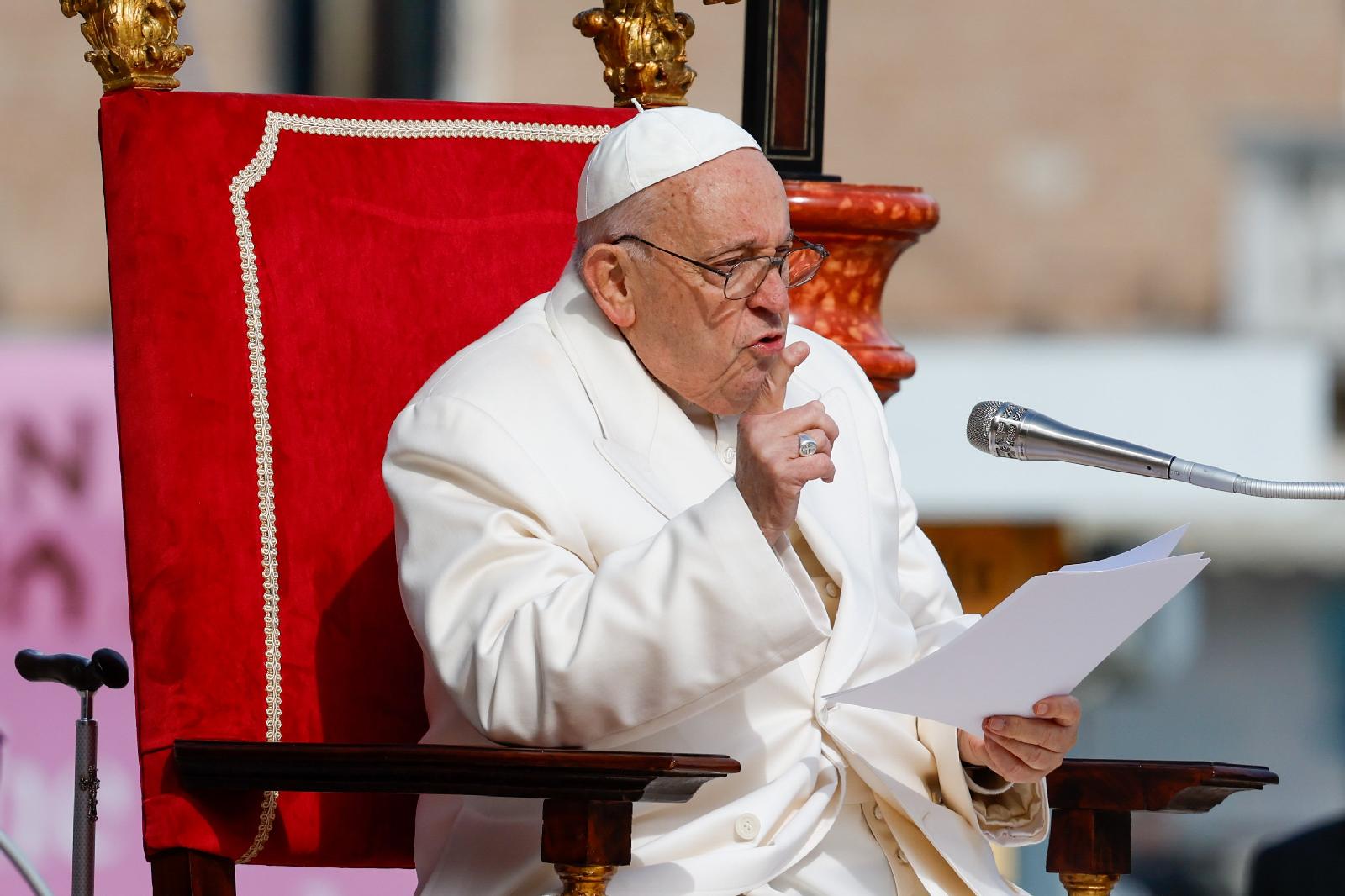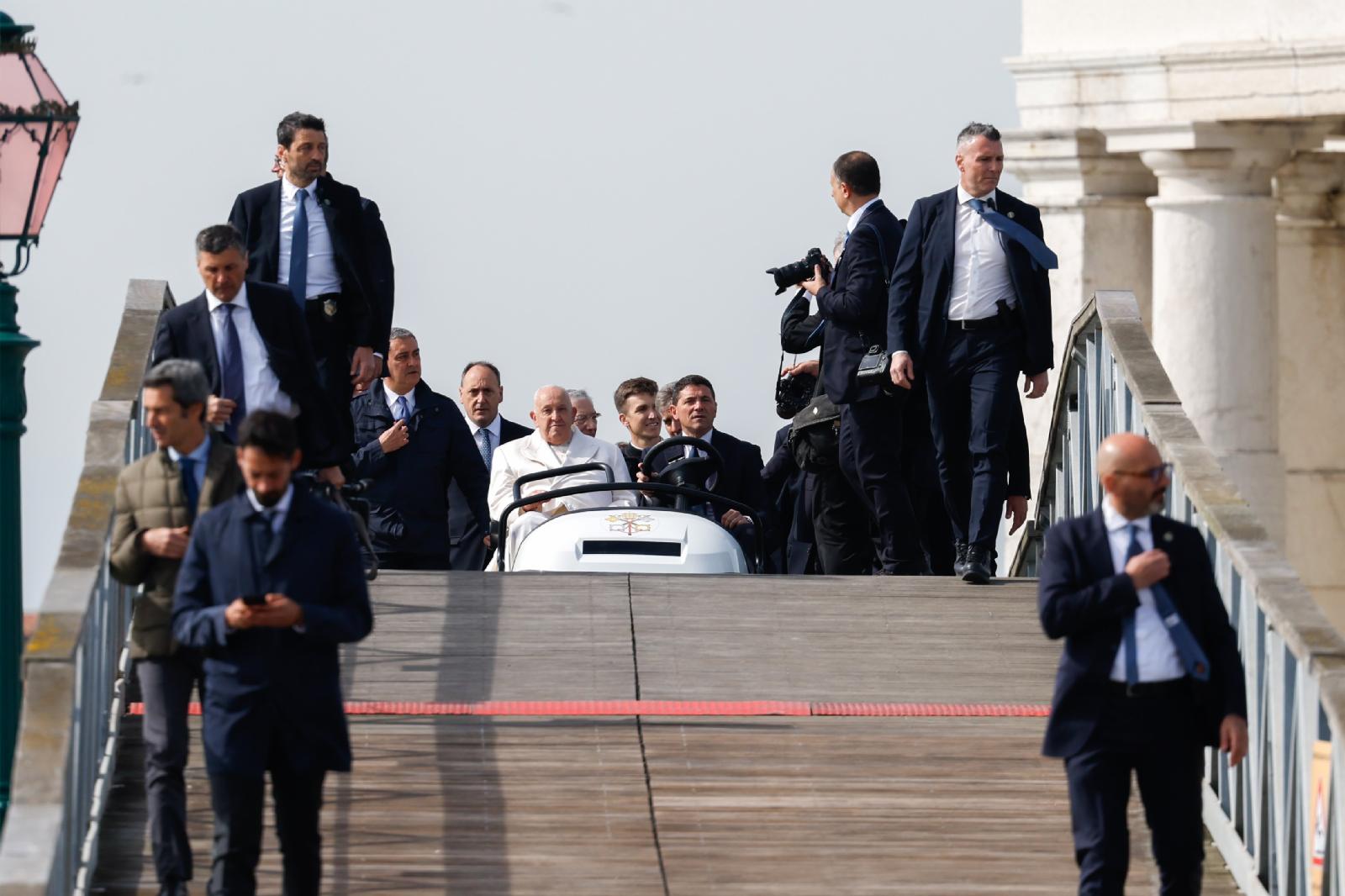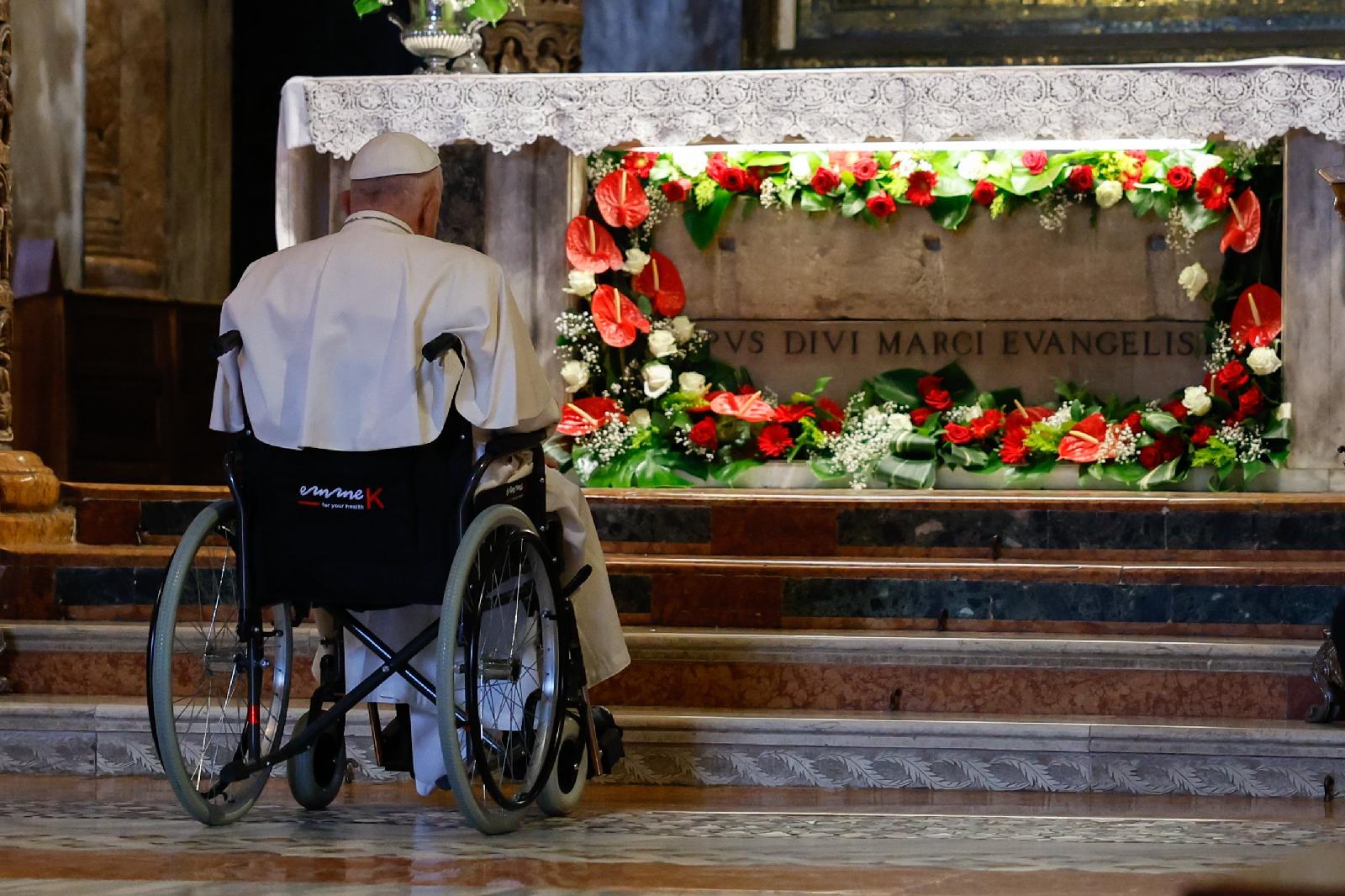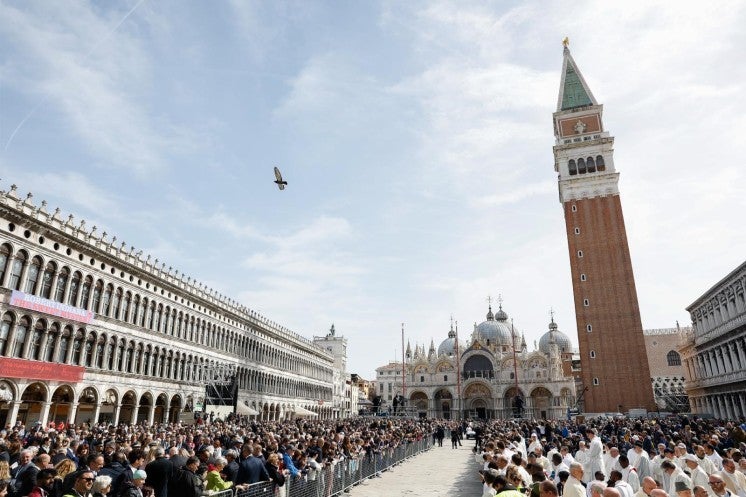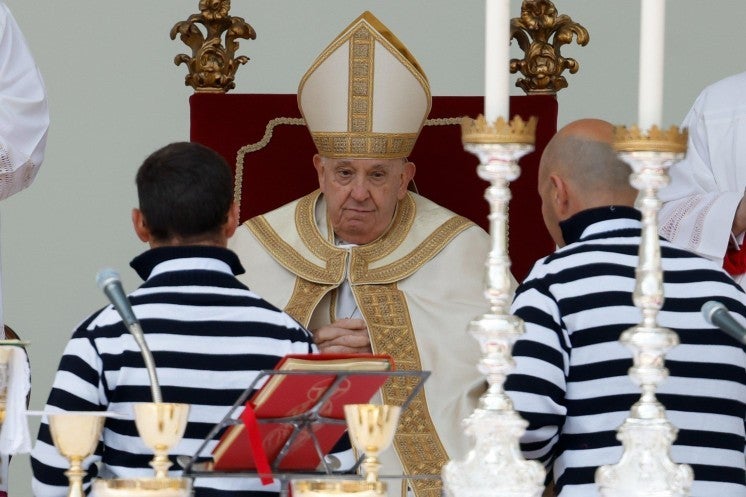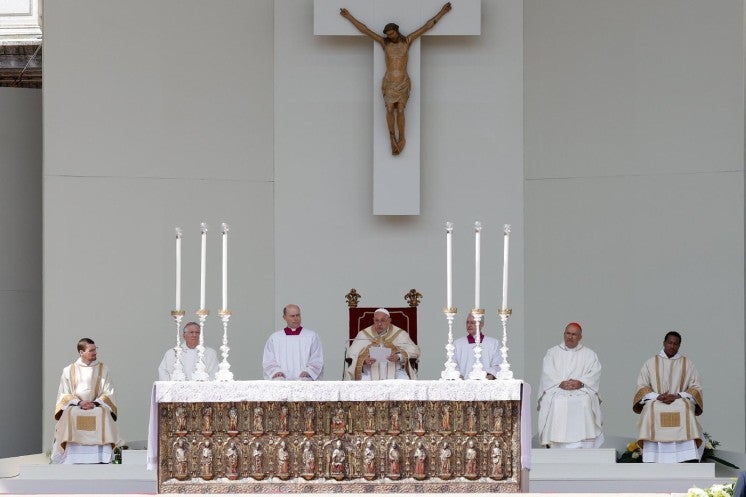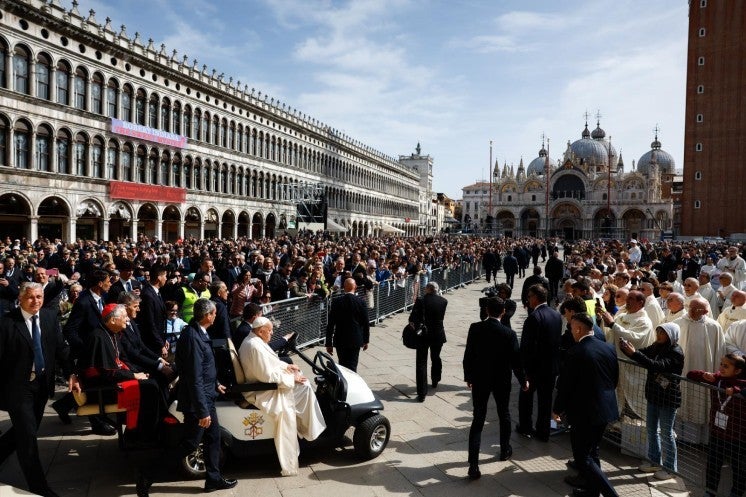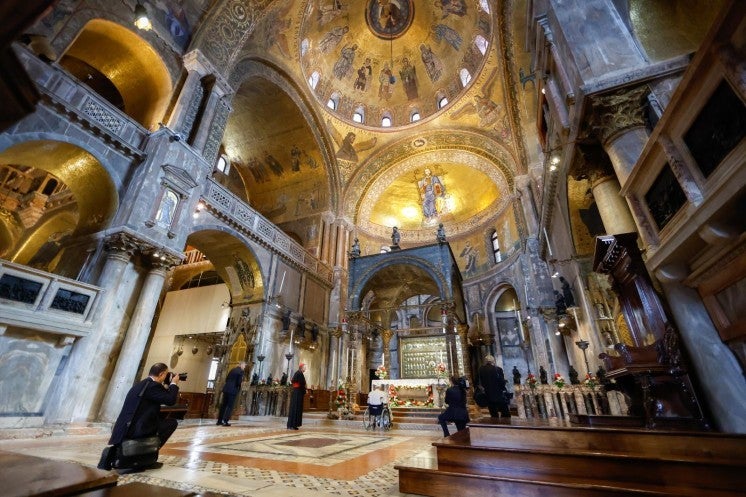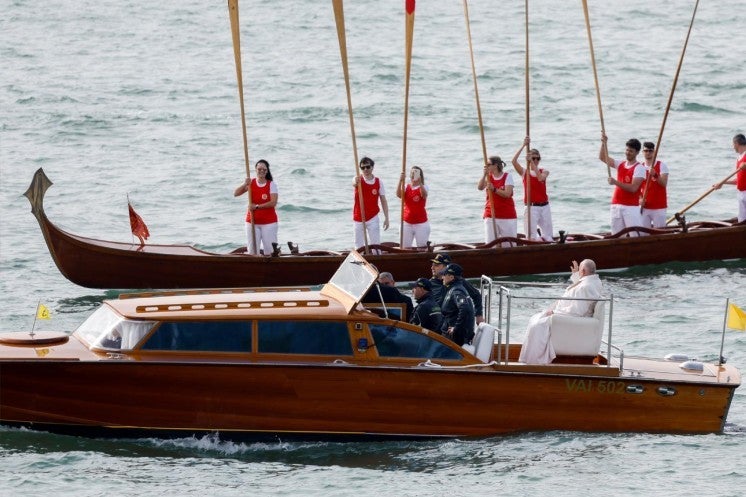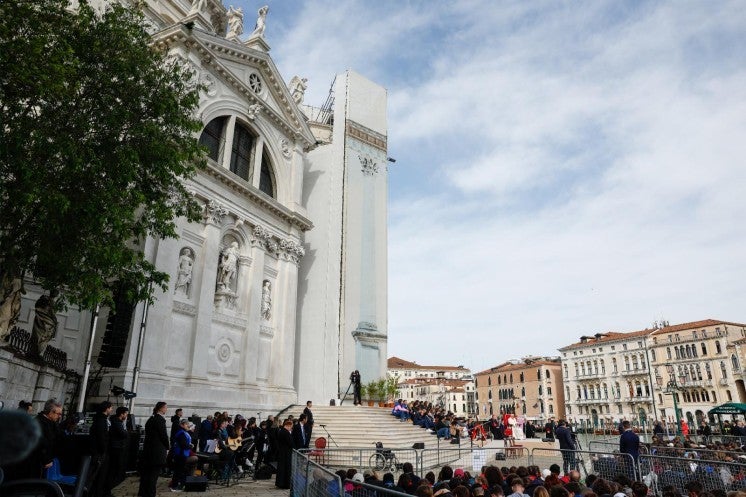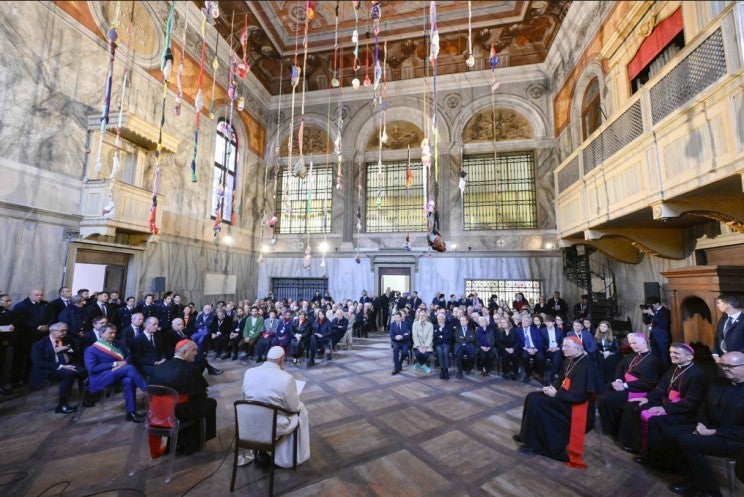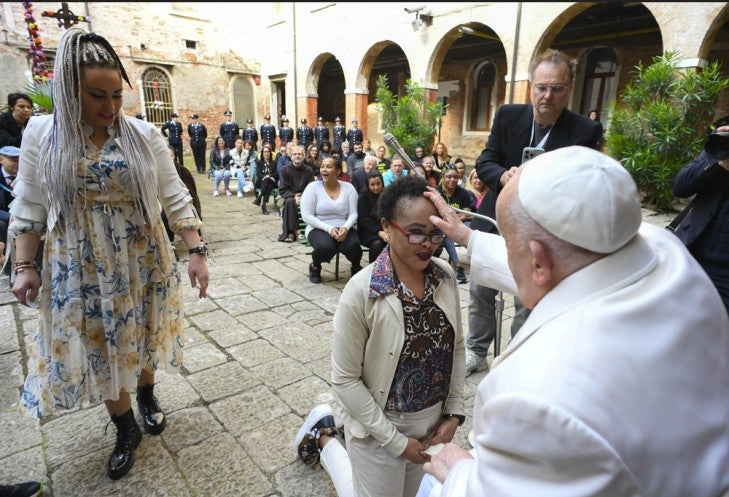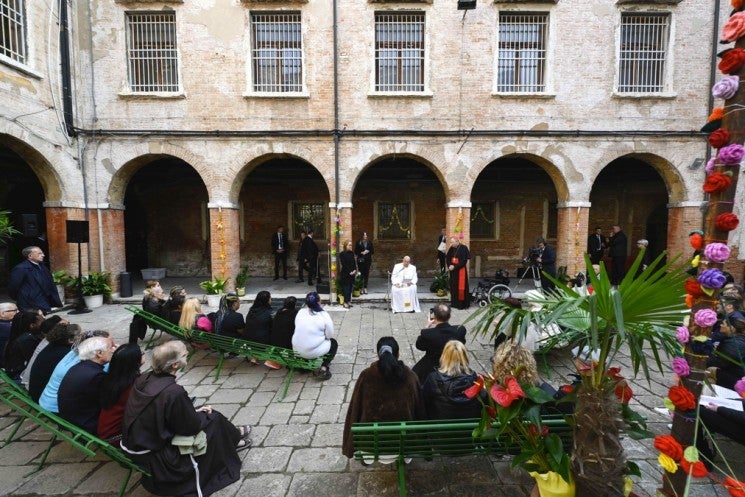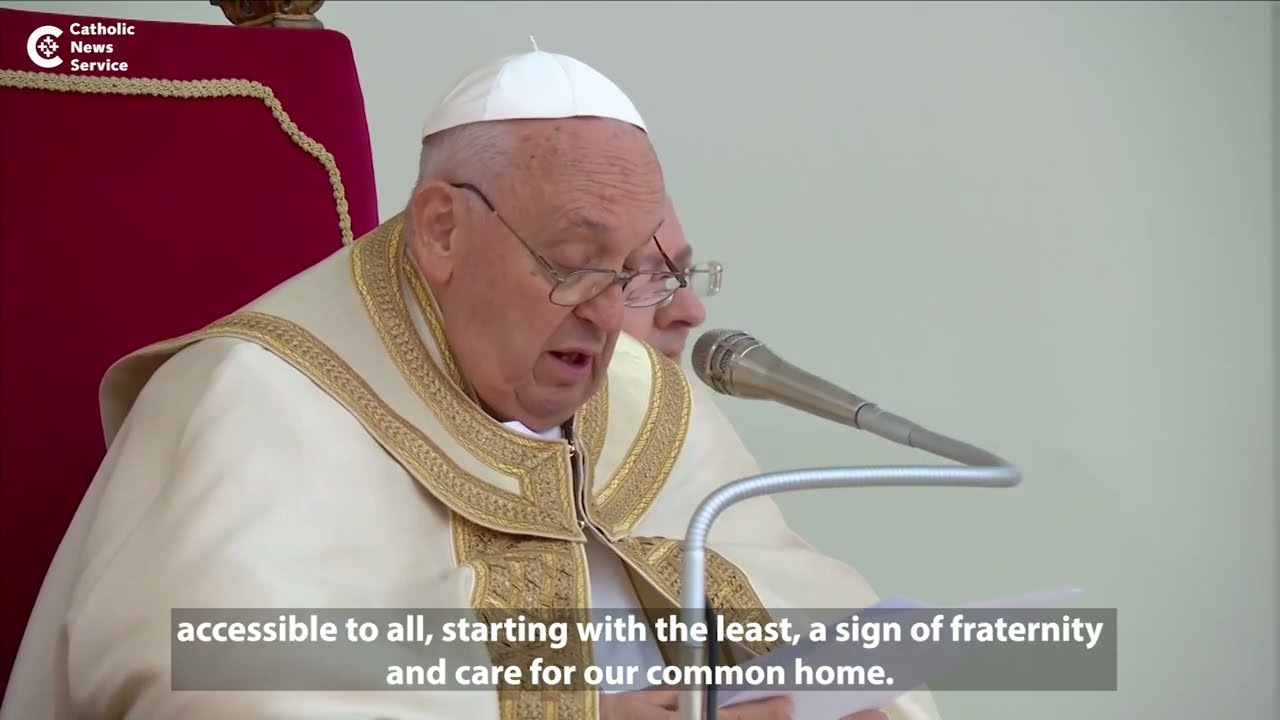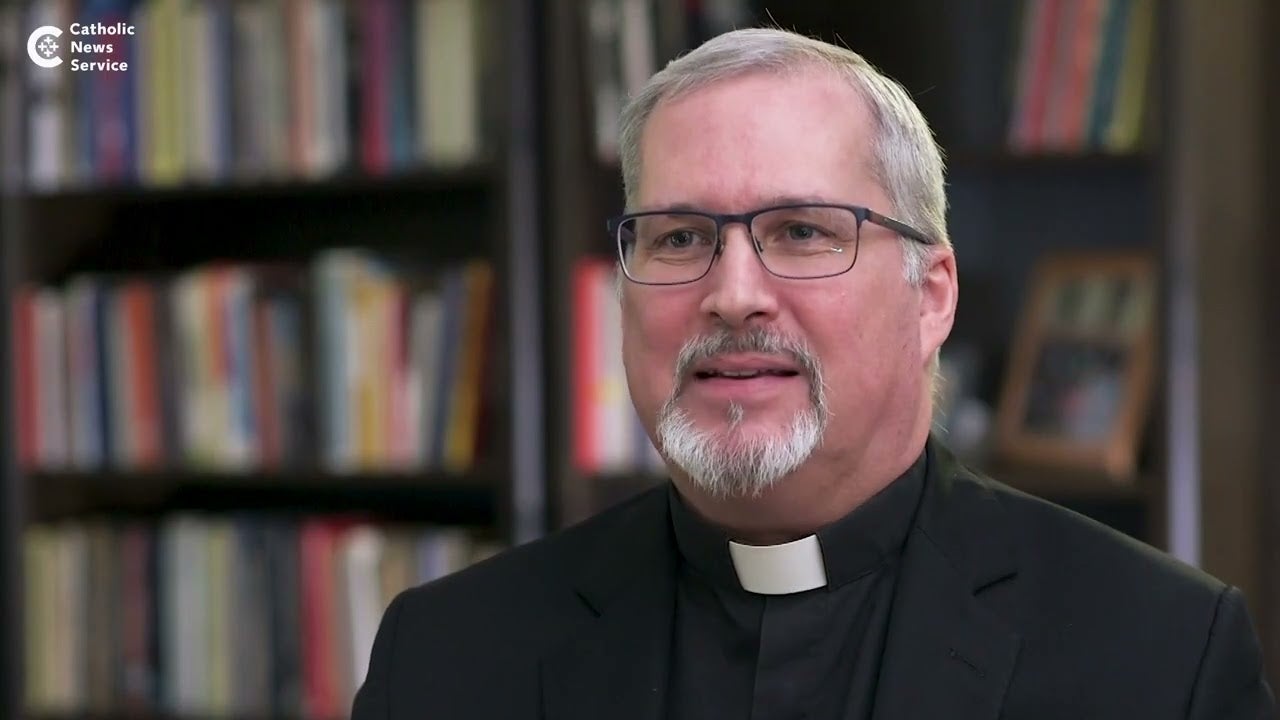Browsing News Entries
Pope Francis arrives in Venice, meets with women inmates and artists
Posted on 04/28/2024 12:00 PM (CNA Daily News)
 Pope Francis waves while traveling by boat in Venice, Italy, for a meeting with young people at the Basilica della Madonna della Salute on April 28, 2024. Earlier in the day he met with inmates at a women's prison. / Credit: Daniel Ibañez/CNA
Pope Francis waves while traveling by boat in Venice, Italy, for a meeting with young people at the Basilica della Madonna della Salute on April 28, 2024. Earlier in the day he met with inmates at a women's prison. / Credit: Daniel Ibañez/CNA
Rome Newsroom, Apr 28, 2024 / 08:00 am (CNA).
Pope Francis opened his one-day visit to Venice on Sunday morning with a meeting with female inmates where he reaffirmed the importance of fraternity and human dignity, noting that prison can be a place of new beginnings.
“A stay in prison can mark the beginning of something new, through the rediscovery of the unsuspected beauty in us and in others, as symbolized by the artistic event you are hosting and the project to which you actively contribute,” the pope said to the female inmates gathered in the intimate courtyard of the Women’s Prison on the Island of Giudecca.
Pope Francis left the Vatican by helicopter at approximately 6:30 in the morning, arriving in the Floating City by 8 a.m. The pope’s visit, albeit short, holds a deep meaning as Francis is the first pontiff to visit the prestigious Venice Biennale art exhibition, which is marking its 60th iteration. As part of the exhibition the Holy See has erected a pavilion at the women’s prison titled “With My Eyes.” The pope also spoke with artists while he visited the pavilion.

Taking a center seat in the intimate courtyard of the 16th-century former convent, the pope opened his address by saying that he wanted it to be thought not as an “official visit” but an “encounter” centered on “prayer, closeness, and fraternal affection.”
“No one should take away people’s dignity,” Pope Francis said to the inmates, volunteers, and staff, joined by the patriarch of Venice, Archbishop Francesco Moraglia.
Drawing attention to the “harsh reality” of prison, the pope highlighted some of the problems inmates are confronted with, “such as overcrowding, the lack of facilities and resources, and episodes of violence, [which] give rise to a great deal of suffering there.”
But Francis, anchoring his message on hope and mercy, implored the women to “always look at the horizon, always look to the future, with hope.”
The pope continued by noting that prison can also be a place of “moral and material rebirth where the dignity of women and men is not ‘placed in isolation’ but promoted through mutual respect and the nurturing of talents and abilities, perhaps dormant or imprisoned by the vicissitudes of life, but which can reemerge for the good of all and which deserve attention and trust.”

Pope Francis stressed that it is “fundamental” that prisons offer inmates “the tools and room for human, spiritual, cultural and professional growth, creating the conditions for their healthy reintegration. Not to ‘isolate dignity’ but to give new possibilities.”
“Let us not forget that we all have mistakes to be forgiven and wounds to heal and that we can all become the healed who bring healing, the forgiven who bring forgiveness, the reborn who bring rebirth,” the pope added.
At the end of the encounter there was a lighthearted exchange when the pope, after asking the inmates — who responded, in unison, “Of course!” — to pray for him, quipped: “But in my favor, not against.”
At the end of the address, the pope presented an icon of the Blessed Virgin Mary as a gift to the inmates, saying: “Mary has tenderness with all of us, with all of us, she is the mother of tenderness.” In return the female inmates presented the pope with a basket of all-natural toiletries they make through a worker-training program.
Following the encounter with the inmates, the pope made his way to the prison’s chapel, where he spoke to the artists, imploring them to use their craft to envision a world based on fraternity where “no human being is considered a stranger.”
“Art has the status of a ‘city of refuge,’” the pope said to the artists, “a city that disobeys the regime of violence and discrimination in order to create forms of human belonging capable of recognizing, including protecting and embracing everyone.”
Democratic Republic of Congo bishops: Amid growth of Church ‘the Congolese state is dead’
Posted on 04/28/2024 11:00 AM (CNA Daily News)
 Members of the Provincial Episcopal Assembly of Bukavu (ASSEPB). / Credit: Radio Moto
Members of the Provincial Episcopal Assembly of Bukavu (ASSEPB). / Credit: Radio Moto
ACI Africa, Apr 28, 2024 / 07:00 am (CNA).
Catholic bishops of the Ecclesiastical Province of Bukavu in the Democratic Republic of Congo (DRC) have denounced the insecurity and violence in their dioceses.
In their collective statement issued Sunday, April 14, the members of the Provincial Episcopal Assembly of Bukavu (ASSEPB) said: “Insecurity has become endemic, with its trail of killings even in the middle of the day, massacres and kidnappings of peaceful citizens in our towns and villages.”
ASSEPB members decried “the opening up of most of our territorial entities; the [rebel group] M23s surrounding of the town of Goma supported by Rwanda; and the strategy of paralyzing the economy by isolating and suffocating large and small towns.”
“Despite the holding of elections, the Congolese state remains weak and ineffective,” they further lamented.
The Catholic Church leaders faulted the President Felix Tshisekedi-led government for leaving citizens to their own devices, saying: “The Congolese state is dead, and we, the governed, are abandoned to our sad fate; and we see no indication that today’s rulers are thinking about the well-being of the governed in the near future.”
“One wonders whether this behavior is not contributing to the plan for the [fragmentation] and dismemberment of the DRC, even though the people are already opposed to it,” they added.
The Congolese Catholic Church leaders attributed the challenges ordinary people in DRC face to “tribalism, electoral fraud, and the manipulation of almost all social strata” and added that the highlighted social ills “are increasing the suffering of the people.”
They challenged politicians to come to terms with the correct meaning of politics, prioritizing the people of God.
“Politics is the highest form of charity, because its purpose is not to serve oneself but to serve others and society — the people first,” they said.
The bishops cautioned their compatriots against despair, saying that the Congolese people should “refuse to die and remain hopeful, praying unceasingly for their conversion and that of their executioners both inside and outside the country, confident that help comes from the Lord, who made heaven and earth.”
They prayed that the “image of the Congolese, distorted by evil, be restored.”
In their statement, the bishops acknowledged with appreciation “the dynamism of the people of God” and the heroism of priests and women and men religious amid “endemic” insecurity.
“Almost everywhere, parishes are being created, church buildings are coming up, presbyteries are being improved, and many other services [are happening],” the bishops said, adding that the planned beatification of four martyrs — including three members of Xaverian missionaries and a priest — is scheduled to take place Aug. 18 in the Diocese of Uvira and is “a cause for joy.”
This story was first published by ACI Africa, CNA’s news partner in Africa, and has been adapted by CNA.
Like Venice, people are beautiful, fragile, pope says in city built on water
Posted on 04/28/2024 08:30 AM (USCCB News Releases)
VENICE, Italy (CNS) -- Visiting a lagoon of tiny islands, canals and narrow walkways for one day, Pope Francis moved around Venice by boat, bridge and electric golf cart.
Tourists and residents, however, came to a standstill; many were marooned in small neighborhoods as security shut down entire streets and severely limited regular waterway traffic.
The pope's early morning touchdown by helicopter from Rome April 28 brought him first to a women's prison, then by wooden motorboat to the Basilica of St. Mary of Health, a 17th-century church built to honor Mary, invoking her protection and intercession to end a devastating plague that killed nearly one-third of the population in the 1630s.
About 1,500 young people were in front of the basilica singing and cheering to greet the pope as he arrived waving from the boat decorated with a small Vatican flag. He took his place on a chair near the steps looking out onto the turquoise-blue water.
"Arise and go!" he told them. "Open your heart to God, thank him and embrace the beauty that you are; fall in love with your life."
"Walk together with others, color the world with your creativity and paint the streets of life with the Gospel," he said.
Young people must resist inertia and discouragement, he said, "because we are made for Heaven." Tell God, "Here I am!" and recognize and welcome the gift of being made "precious and irreplaceable."
No one is ugly, and everyone carries a priceless treasure inside that is meant to be shared with others, he said. "This is not self-esteem, it is reality! Recognizing this is the first step we should take in the morning when we wake up: get out of bed and accept yourself as a gift."
"Remember that for God, you are not a digital profile," he said, but "a child of heaven."
But, just like Venice, the pope said, people are beautiful and fragile at the same time. Take care of these fragilities and recognize that God always extends a hand, not to blame or punish, but to heal and lift people back up.
Never get isolated, even when one's friends are stuck at home behind screens and video games, he told the young people.
This is not easy, he said, but take advice from Venetian wisdom that says one can only go far by consistently and steadily rowing.
It is tiring, he said, especially when one must go against the tide, but perseverance brings rewards, and it is better done together and with God's guidance.
Accompanied by a delegation of young people, Pope Francis then went by electric golf cart to St. Mark's Square by crossing a "bridge of boats," a floating pontoon bridge that is a traditional Venetian way of temporarily connecting opposite shores. Guests, some still in bathrobes, staying at a waterfront hotel peered out their large balcony windows to see the unusual sight.
More than 10,000 people packed the huge square for Mass and to pray the "Regina Coeli." In his homily, the pope said Jesus' metaphor of being the grapevine while believers are the branches "expresses God's loving care for us; it also warns us that if we sever this connection with the Lord, we cannot produce fruits of good life and risk becoming dry branches, which will be cast aside."
"This is what matters: to remain in the Lord, to dwell in him," which does not mean standing still or being passive. "Indeed, it invites us to move, because to remain in the Lord means to grow in relationship with him."
"As we gaze upon this city of Venice today, we admire its enchanting beauty. Yet, we are also concerned about the many issues that threaten it: climate change, which impacts the waters of the lagoon and the land," he said.
He highlighted the problems facing the city's architecture, cultural heritage and people, noting "the difficulty of creating an environment that is fit for human beings through adequate tourism management."
Christians must remain united to Christ so "we can bring the fruits of the Gospel into the reality we inhabit: fruits of justice and peace, fruits of solidarity and mutual care; carefully-made choices to preserve our environmental and human heritage," he said.
"We need our Christian communities, neighborhoods and cities to become welcoming, inclusive and hospitable places," he said.
After Mass and the "Regina Coeli" prayer, the pope greeted the faithful in the square and went into St. Mark's Basilica to venerate the relics of St. Mark the Evangelist. He also greeted local volunteers who assisted with the visit and then returned to Rome by helicopter. By early afternoon, the streets, squares and waterways of Venice were again freed up for the throngs of visitors.
Fifth Sunday of Easter
Posted on 04/28/2024 08:30 AM (USCCB Daily Readings)
Reading 1 Acts 9:26-31
but they were all afraid of him,
not believing that he was a disciple.
Then Barnabas took charge of him and brought him to the apostles,
and he reported to them how he had seen the Lord,
and that he had spoken to him,
and how in Damascus he had spoken out boldly in the name of Jesus.
He moved about freely with them in Jerusalem,
and spoke out boldly in the name of the Lord.
He also spoke and debated with the Hellenists,
but they tried to kill him.
And when the brothers learned of this,
they took him down to Caesarea
and sent him on his way to Tarsus.
The church throughout all Judea, Galilee, and Samaria was at peace.
It was being built up and walked in the fear of the Lord,
and with the consolation of the Holy Spirit it grew in numbers.
Responsorial Psalm Ps 22:26-27, 28, 30, 31-32
or:
R. Alleluia.
I will fulfill my vows before those who fear the LORD.
The lowly shall eat their fill;
they who seek the LORD shall praise him:
"May your hearts live forever!"
R. I will praise you, Lord, in the assembly of your people.
or:
R. Alleluia.
All the ends of the earth
shall remember and turn to the LORD;
all the families of the nations
shall bow down before him.
R. I will praise you, Lord, in the assembly of your people.
or:
R. Alleluia.
To him alone shall bow down
all who sleep in the earth;
before him shall bend
all who go down into the dust.
R. I will praise you, Lord, in the assembly of your people.
or:
R. Alleluia.
And to him my soul shall live;
my descendants shall serve him.
Let the coming generation be told of the LORD
that they may proclaim to a people yet to be born
the justice he has shown.
R. I will praise you, Lord, in the assembly of your people.
or:
R. Alleluia.
Reading 2 1 Jn 3:18-24
but in deed and truth.
Now this is how we shall know that we belong to the truth
and reassure our hearts before him
in whatever our hearts condemn,
for God is greater than our hearts and knows everything.
Beloved, if our hearts do not condemn us,
we have confidence in God
and receive from him whatever we ask,
because we keep his commandments and do what pleases him.
And his commandment is this:
we should believe in the name of his Son, Jesus Christ,
and love one another just as he commanded us.
Those who keep his commandments remain in him, and he in them,
and the way we know that he remains in us
is from the Spirit he gave us.
Alleluia Jn 15:4a, 5b
Remain in me as I remain in you, says the Lord.
Whoever remains in me will bear much fruit.
R. Alleluia, alleluia.
Gospel Jn 15:1-8
"I am the true vine, and my Father is the vine grower.
He takes away every branch in me that does not bear fruit,
and every one that does he prunes so that it bears more fruit.
You are already pruned because of the word that I spoke to you.
Remain in me, as I remain in you.
Just as a branch cannot bear fruit on its own
unless it remains on the vine,
so neither can you unless you remain in me.
I am the vine, you are the branches.
Whoever remains in me and I in him will bear much fruit,
because without me you can do nothing.
Anyone who does not remain in me
will be thrown out like a branch and wither;
people will gather them and throw them into a fire
and they will be burned.
If you remain in me and my words remain in you,
ask for whatever you want and it will be done for you.
By this is my Father glorified,
that you bear much fruit and become my disciples."
Lectionary for Mass for Use in the Dioceses of the United States, second typical edition, Copyright © 2001, 1998, 1997, 1986, 1970 Confraternity of Christian Doctrine; Psalm refrain © 1968, 1981, 1997, International Committee on English in the Liturgy, Inc. All rights reserved. Neither this work nor any part of it may be reproduced, distributed, performed or displayed in any medium, including electronic or digital, without permission in writing from the copyright owner.
Saturday of the Fourth Week of Easter
Posted on 04/27/2024 08:30 AM (USCCB Daily Readings)
Reading 1 Acts 13:44-52
On the following sabbath
almost the whole city
gathered to hear the word of the Lord.
When the Jews saw the crowds, they were filled with jealousy
and with violent abuse contradicted what Paul said.
Both Paul and Barnabas spoke out boldly and said,
“It was necessary that the word of God be spoken to you first,
but since you reject it
and condemn yourselves as unworthy of eternal life,
we now turn to the Gentiles.
For so the Lord has commanded us,
I have made you a light to the Gentiles,
that you may be an instrument of salvation
to the ends of the earth.”
The Gentiles were delighted when they heard this
and glorified the word of the Lord.
All who were destined for eternal life came to believe,
and the word of the Lord continued to spread
through the whole region.
The Jews, however, incited the women of prominence who were worshipers
and the leading men of the city,
stirred up a persecution against Paul and Barnabas,
and expelled them from their territory.
So they shook the dust from their feet in protest against them
and went to Iconium.
The disciples were filled with joy and the Holy Spirit.
Responsorial Psalm 98:1, 2-3ab, 3cd-4
R. (3cd) All the ends of the earth have seen the saving power of God.
or:
R. Alleluia.
Sing to the LORD a new song,
for he has done wondrous deeds;
His right hand has won victory for him,
his holy arm.
R. All the ends of the earth have seen the saving power of God.
or:
R. Alleluia.
The LORD has made his salvation known:
in the sight of the nations he has revealed his justice.
He has remembered his kindness and his faithfulness
toward the house of Israel.
R. All the ends of the earth have seen the saving power of God.
or:
R. Alleluia.
All the ends of the earth have seen
the salvation by our God.
Sing joyfully to the LORD, all you lands;
break into song; sing praise.
R. All the ends of the earth have seen the saving power of God.
or:
R. Alleluia.
Alleluia Jn 8:31b-32
R. Alleluia, alleluia.
If you remain in my word, you will truly be my disciples,
and you will know the truth, says the Lord.
R. Alleluia, alleluia.
Gospel Jn 14:7-14
Jesus said to his disciples:
“If you know me, then you will also know my Father.
From now on you do know him and have seen him.”
Philip said to Jesus,
“Master, show us the Father, and that will be enough for us.”
Jesus said to him, “Have I been with you for so long a time
and you still do not know me, Philip?
Whoever has seen me has seen the Father.
How can you say, ‘Show us the Father’?
Do you not believe that I am in the Father and the Father is in me?
The words that I speak to you I do not speak on my own.
The Father who dwells in me is doing his works.
Believe me that I am in the Father and the Father is in me,
or else, believe because of the works themselves.
Amen, amen, I say to you,
whoever believes in me will do the works that I do,
and will do greater ones than these,
because I am going to the Father.
And whatever you ask in my name, I will do,
so that the Father may be glorified in the Son.
If you ask anything of me in my name, I will do it.”
Lectionary for Mass for Use in the Dioceses of the United States, second typical edition, Copyright © 2001, 1998, 1997, 1986, 1970 Confraternity of Christian Doctrine; Psalm refrain © 1968, 1981, 1997, International Committee on English in the Liturgy, Inc. All rights reserved. Neither this work nor any part of it may be reproduced, distributed, performed or displayed in any medium, including electronic or digital, without permission in writing from the copyright owner.
Catholic chat bot: Putting AI at the service of the church
Posted on 04/26/2024 08:30 AM (USCCB News Releases)
VATICAN CITY (CNS) -- Before converting to Catholicism, Michael Baggot took his questions about faith and the church to the first place many people go with their questions: the internet.
Now a member of the Legionaries of Christ and a priest, Father Baggot spoke of "how important those online resources were for me in providing information and guidance, and how instrumental in God's providence they were to bring me eventually to baptism, to confirmation and to first holy Communion."
But some 20 years after his conversion, the internet has radically changed. Artificially intelligent chatbots are becoming a normal means for accessing information while omnipresent algorithms largely determine the type of content people encounter online in search results and on social media. And the Catholic Church is taking notice.
Pope Francis focused his messages for the church's 2024 celebrations of World Peace Day and World Communications Day on the use of artificial intelligence. He wrote that AI-powered systems "can help to overcome ignorance and facilitate the exchange of information," but he voiced his concern that such a rapid digital revolution can imprison people in "echo chambers" and leave humanity "adrift in a mire of confusion, prey to the interests of the market or of the powers that be."
Speaking at a conference April 18, Father Baggot said that while Catholics must have "an awareness of human sin and the capacity to misuse technology" when thinking about artificial intelligence, they must also have "confidence in grace, in redemption and the ability to harness these technologies well."
To that end, the conference at the Pontifical Oriental Institute, a Jesuit-run academic institution dedicated to studying Eastern Christianity, explored how the church can leverage the power of artificially intelligent tools to its benefit, showcasing two products developed by Longbeard -- a digital services company focused on Catholic-related projects.
MagisteriumAI, a large language model with an interface similar to ChatGPT's, seeks to synthesize and explain church teaching in natural language while drawing from more than 5,700 magisterial documents and over 2,300 Catholic theological and philosophical works. The other tool, Vulgate, allows scholars to upload entire libraries onto a platform, converting the contents into data that can be easily searched for, translated and summarized.
"When we saw ChatGPT out there and we learned that Catholics were using it to ask doctrinal questions and things like that, it drove us to then say, can we do this better than ChatGPT?" Matthew Sanders, CEO of Longbeard, said at the forum.
He demonstrated how MagisteriumAI responded to several different queries posed to it in different languages. One question he asked was, "What does the church say about Islam?" to which MagisteriumAI responded, "The Church regards Muslims with esteem" before elaborating further and citing six magisterial documents that users could read by following the links.
"When ChatGPT first came out, one of the concerns was it was generating responses but not providing transparency as to where that generation came from," Sanders said. "One of the first things we tried to do when we designed this AI system was to make sure there is transparency so that whatever answer is being generated by the system, you can see where that generation is coming from."
He added that the MagisteriumAI team had implemented a number of techniques to improve the tool's accuracy by greatly cutting down on its rate of "hallucinations" -- when AI systems provide incorrect and sometimes incoherent information in an effort to provide a response at any cost, even when they do not have the information available to do so.
Still, Sanders noted that the product is still in its beta stage and needs improvement although it is already being used in 150 countries by people ranging from bishops to high school students.
Catholic News Service asked him about the potential risks of entrusting complicated pastoral questions to an AI system. For example, when asked whether a Catholic priest can bless people in a same-sex relationship, MagisteriumAI answered "no," despite recent guidance from the Vatican allowing priests to discern when such a blessing could be opportune.
MagisteriumAI is "a tool that can be useful in some cases and in others, not so much," Sanders said. "All of its answers may not be perfect, if it seems like it's imperfect you should talk to a human being."
He added that it is particularly important to educate students and communities in the use of AI tools such as MagisteriumAI "so they understand what it is and what it is not."
Discussing MagisteriumAI as an evangelization tool, Father Baggot said, "When you start to explore the church's resources, you can be very easily intimidated by a long list of Latin titles, but with a system like MagisteriumAI you can enter into a kind of dialogue, and you can begin right with the questions that interest you most and that will eventually open you up to the broader picture."
"I see this as a great tool to first engage and give a kind of safe space, if you will, where people can explore these issues that they would never bring up to friends or family or other colleagues at a certain moment in their life," he said, noting that after online information gathering people will eventually want to talk to a human being about their questions.
"It's meant to bring us to another in-person experience," he said.
Friday of the Fourth Week of Easter
Posted on 04/26/2024 08:30 AM (USCCB Daily Readings)
Reading I Acts 13:26-33
When Paul came to Antioch in Pisidia, he said in the synagogue:
“My brothers, children of the family of Abraham,
and those others among you who are God-fearing,
to us this word of salvation has been sent.
The inhabitants of Jerusalem and their leaders failed to recognize him,
and by condemning him they fulfilled the oracles of the prophets
that are read sabbath after sabbath.
For even though they found no grounds for a death sentence,
they asked Pilate to have him put to death,
and when they had accomplished all that was written about him,
they took him down from the tree and placed him in a tomb.
But God raised him from the dead,
and for many days he appeared to those
who had come up with him from Galilee to Jerusalem.
These are now his witnesses before the people.
We ourselves are proclaiming this good news to you
that what God promised our fathers
he has brought to fulfillment for us, their children, by raising up Jesus,
as it is written in the second psalm,
You are my Son; this day I have begotten you.”
Responsorial Psalm 2:6-7, 8-9, 10-11ab
R. (7bc) You are my Son; this day I have begotten you.
or:
R. Alleluia.
“I myself have set up my king
on Zion, my holy mountain.”
I will proclaim the decree of the LORD:
The LORD said to me, “You are my Son;
this day I have begotten you.”
R. You are my Son; this day I have begotten you.
or:
R. Alleluia.
“Ask of me and I will give you
the nations for an inheritance
and the ends of the earth for your possession.
You shall rule them with an iron rod;
you shall shatter them like an earthen dish.”
R. You are my Son; this day I have begotten you.
or:
R. Alleluia.
And now, O kings, give heed;
take warning, you rulers of the earth.
Serve the LORD with fear, and rejoice before him;
with trembling rejoice.
R. You are my Son; this day I have begotten you.
or:
R. Alleluia.
Alleluia Jn 14:6
R. Alleluia, alleluia.
I am the way and the truth and the life, says the Lord;
no one comes to the Father except through me.
R. Alleluia, alleluia.
Gospel Jn 14:1-6
Jesus said to his disciples:
“Do not let your hearts be troubled.
You have faith in God; have faith also in me.
In my Father’s house there are many dwelling places.
If there were not,
would I have told you that I am going to prepare a place for you?
And if I go and prepare a place for you,
I will come back again and take you to myself,
so that where I am you also may be.
Where I am going you know the way.”
Thomas said to him,
“Master, we do not know where you are going;
how can we know the way?”
Jesus said to him, “I am the way and the truth and the life.
No one comes to the Father except through me.”
Lectionary for Mass for Use in the Dioceses of the United States, second typical edition, Copyright © 2001, 1998, 1997, 1986, 1970 Confraternity of Christian Doctrine; Psalm refrain © 1968, 1981, 1997, International Committee on English in the Liturgy, Inc. All rights reserved. Neither this work nor any part of it may be reproduced, distributed, performed or displayed in any medium, including electronic or digital, without permission in writing from the copyright owner.
Feast of Saint Mark, evangelist
Posted on 04/25/2024 08:30 AM (USCCB Daily Readings)
Reading 1 1 Pt 5:5b-14
Beloved:
Clothe yourselves with humility
in your dealings with one another, for:
God opposes the proud
but bestows favor on the humble.
So humble yourselves under the mighty hand of God,
that he may exalt you in due time.
Cast all your worries upon him because he cares for you.
Be sober and vigilant.
Your opponent the Devil is prowling around like a roaring lion
looking for someone to devour.
Resist him, steadfast in faith,
knowing that your brothers and sisters throughout the world
undergo the same sufferings.
The God of all grace
who called you to his eternal glory through Christ Jesus
will himself restore, confirm, strengthen, and establish you
after you have suffered a little.
To him be dominion forever. Amen.
I write you this briefly through Silvanus,
whom I consider a faithful brother,
exhorting you and testifying that this is the true grace of God.
Remain firm in it.
The chosen one at Babylon sends you greeting, as does Mark, my son.
Greet one another with a loving kiss.
Peace to all of you who are in Christ.
Responsorial Psalm 89:2-3, 6-7, 16-17
R. (2) For ever I will sing the goodness of the Lord.
or:
R. Alleluia.
The favors of the LORD I will sing forever;
through all generations my mouth shall proclaim your faithfulness.
For you have said, “My kindness is established forever”;
in heaven you have confirmed your faithfulness.
R. For ever I will sing the goodness of the Lord.
or:
R. Alleluia.
The heavens proclaim your wonders, O LORD,
and your faithfulness, in the assembly of the holy ones.
For who in the skies can rank with the LORD?
Who is like the LORD among the sons of God?
R. For ever I will sing the goodness of the Lord.
or:
R. Alleluia.
Blessed the people who know the joyful shout;
in the light of your countenance, O LORD, they walk.
At your name they rejoice all the day,
and through your justice they are exalted.
R. For ever I will sing the goodness of the Lord.
or:
R. Alleluia.
Alleluia 1 Cor 1:23a-24b
R. Alleluia, alleluia.
We proclaim Christ crucified;
he is the power of God and the wisdom of God.
R. Alleluia, alleluia.
Gospel Mk 16:15-20
Jesus appeared to the Eleven and said to them:
“Go into the whole world
and proclaim the Gospel to every creature.
Whoever believes and is baptized will be saved;
whoever does not believe will be condemned.
These signs will accompany those who believe:
in my name they will drive out demons,
they will speak new languages.
They will pick up serpents with their hands,
and if they drink any deadly thing, it will not harm them.
They will lay hands on the sick, and they will recover.”
Then the Lord Jesus, after he spoke to them,
was taken up into heaven
and took his seat at the right hand of God.
But they went forth and preached everywhere,
while the Lord worked with them
and confirmed the word through accompanying signs.
Lectionary for Mass for Use in the Dioceses of the United States, second typical edition, Copyright © 2001, 1998, 1997, 1986, 1970 Confraternity of Christian Doctrine; Psalm refrain © 1968, 1981, 1997, International Committee on English in the Liturgy, Inc. All rights reserved. Neither this work nor any part of it may be reproduced, distributed, performed or displayed in any medium, including electronic or digital, without permission in writing from the copyright owner.
Wednesday of the Fourth Week of Easter
Posted on 04/24/2024 08:30 AM (USCCB Daily Readings)
Reading I Acts 12:24—13:5a
The word of God continued to spread and grow.
After Barnabas and Saul completed their relief mission,
they returned to Jerusalem,
taking with them John, who is called Mark.
Now there were in the Church at Antioch prophets and teachers:
Barnabas, Symeon who was called Niger, Lucius of Cyrene,
Manaen who was a close friend of Herod the tetrarch, and Saul.
While they were worshiping the Lord and fasting, the Holy Spirit said,
“Set apart for me Barnabas and Saul
for the work to which I have called them.”
Then, completing their fasting and prayer,
they laid hands on them and sent them off.
So they, sent forth by the Holy Spirit,
went down to Seleucia
and from there sailed to Cyprus.
When they arrived in Salamis,
they proclaimed the word of God in the Jewish synagogues.
Responsorial Psalm 67:2-3, 5, 6 and 8
R. (4) O God, let all the nations praise you!
or:
R. Alleluia.
May God have pity on us and bless us;
may he let his face shine upon us.
So may your way be known upon earth;
among all nations, your salvation.
R. O God, let all the nations praise you!
or:
R. Alleluia.
May the nations be glad and exult
because you rule the peoples in equity;
the nations on the earth you guide.
R. O God, let all the nations praise you!
or:
R. Alleluia.
May the peoples praise you, O God;
may all the peoples praise you!
May God bless us,
and may all the ends of the earth fear him!
R. O God, let all the nations praise you!
or:
R. Alleluia.
Alleluia Jn 8:12
R. Alleluia, alleluia.
I am the light of the world, says the Lord;
whoever follows me will have the light of life.
R. Alleluia, alleluia.
Gospel Jn 12:44-50
Jesus cried out and said,
“Whoever believes in me believes not only in me
but also in the one who sent me,
and whoever sees me sees the one who sent me.
I came into the world as light,
so that everyone who believes in me might not remain in darkness.
And if anyone hears my words and does not observe them,
I do not condemn him,
for I did not come to condemn the world but to save the world.
Whoever rejects me and does not accept my words
has something to judge him: the word that I spoke,
it will condemn him on the last day,
because I did not speak on my own,
but the Father who sent me commanded me what to say and speak.
And I know that his commandment is eternal life.
So what I say, I say as the Father told me.”
- Readings for the Optional Memorial of Saint Fidelis of Sigmaringen, priest and martyr
Lectionary for Mass for Use in the Dioceses of the United States, second typical edition, Copyright © 2001, 1998, 1997, 1986, 1970 Confraternity of Christian Doctrine; Psalm refrain © 1968, 1981, 1997, International Committee on English in the Liturgy, Inc. All rights reserved. Neither this work nor any part of it may be reproduced, distributed, performed or displayed in any medium, including electronic or digital, without permission in writing from the copyright owner.


